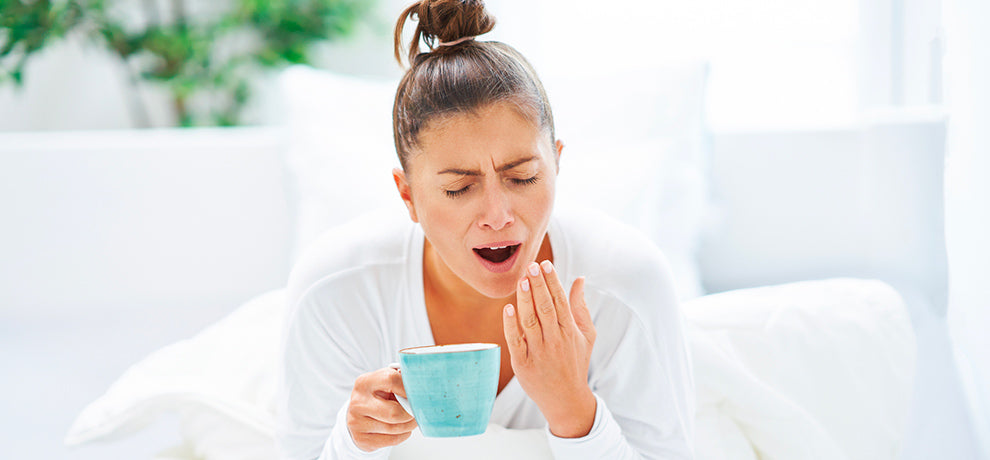Insomnia: What to do? Effective solutions to get your sleep back.
Insomnia is one of the most common sleep disorders: difficulty falling asleep, repeated nighttime awakenings, light sleep, or the inability to get restorative rest . This problem, which affects nearly 20% of the French population , has a considerable impact on health and quality of life. Persistent fatigue, difficulty concentrating, irritability, and mood disorders are all consequences that can become part of daily life.
Faced with these situations, many people wonder: what to do about insomnia? The good news is that there are concrete and natural solutions to regain sleep, reduce stress, and improve sleep quality in the long term.
What is insomnia and why is it a major health problem?
Insomnia is defined as a sleep disorder characterized by difficulty falling asleep, staying asleep, or getting truly restorative rest . It can be occasional (a few disturbed nights), transient (often linked to a specific factor such as a life change or stress), or chronic when it lasts for more than three months.
Its consequences are numerous: intense fatigue during the day, irritability and nervousness, weakened memory and difficulty concentrating, increased risk of accidents or errors ...
In the long term, problems related to lack of sleep promote certain diseases: diabetes, hypertension, cardiovascular problems. Therefore, treating insomnia is not just about "sleeping better," but about protecting overall health .
The main causes of insomnia
Identifying the cause is essential before choosing the most effective solution.
-
Stress and anxiety : life events, work, personal relationships, or trauma can disrupt sleep patterns. In these cases, using natural solutions to reduce stress, such as the Calmigem anti-stress spray or the entire GEMMOCAPS® STRESS-PROTECT range, can be a first step.
-
Mood disorders : depression and generalized anxiety are among the most frequent factors.
-
Lifestyle habits : excessive consumption of stimulants such as coffee, tea, alcohol, tobacco, but also screens (computers, social networks) before bedtime.
-
Physical problems : chronic pain, neurological disease, hormonal changes (pregnancy, menopause, PMS...)
These different disorders sometimes combine and complicate treatment.
The consequences of insomnia on health and daily life.
Sleep is an essential foundation for the balance of the body and nervous system . When it is disturbed:
-
Concentration and memory weaken, increasing difficulties in daily life.
-
The risk of domestic, road, or workplace accidents increases.
-
In the long term, the repercussions include medical treatment for conditions such as high blood pressure or diabetes.
-
On a social level: family tensions, isolation, decreased performance at work .
These consequences show that it is essential to fight insomnia in order to preserve one's quality of life .
What lifestyle rules can help you sleep better?
Sometimes, small gestures are enough to improve sleep quality. Adopting a regular rhythm , going to bed and waking up at the same time, even on weekends, helps stabilize the biological clock .
Creating a conducive atmosphere in the bedroom (dark, calm, with a suitable temperature and a comfortable bed) also promotes falling asleep. It is advisable to limit stimulants such as caffeine, alcohol, tobacco or sodas, at least one hour before bedtime. Finally, establishing relaxation rituals such as reading, meditation or breathing exercises can prepare the body and mind for rest. Also be careful with naps that are too long , which can disrupt the circadian rhythm.
The role of the circadian rhythm in sleep
The circadian rhythm is the internal clock that regulates our biological functions over 24 hours. A true natural metronome , it influences not only the alternation between sleep and wakefulness but also body temperature, digestion, hormone secretion, and even mood. This cycle is largely based on melatonin, often called the "sleep hormone," whose production increases at nightfall to signal the body that it is time to rest.
When this rhythm is disrupted, the consequences are quickly felt. Night shift workers, whose schedules are reversed compared to the natural day-night cycle, or travelers subject to jet lag, are well aware of these disruptions. Persistent fatigue, difficulty falling asleep, nighttime awakenings, or daytime sleepiness are the most frequent signs.
In these situations, certain approaches can help resynchronize the body. Light therapy , for example, acts as a true regulator: exposure to specific artificial light stimulates hormone secretion and reminds the body of the natural rhythm of the day. Regular exposure to morning light , combined with good sleep hygiene, also helps restore balance.
Respecting this biological rhythm, as much as possible, remains fundamental to preserving restorative sleep. This involves regular schedules, a clear alternation between periods of activity and rest, and paying particular attention to the lighting environment . By harmonizing our habits with our internal clock, we give the body the opportunity to regenerate better and limit the onset of insomnia.
The effects of jet lag on sleep
Jet lag is a frequent cause of sleep disturbances. The biological clock becomes disrupted, leading to difficulty falling asleep and nighttime awakenings. Frequent travelers or people working shift work are particularly susceptible. To alleviate these problems, it is advisable to gradually adapt one's rhythm, expose oneself to natural light, and engage in relaxing activities . In some cases, dietary supplements can provide support, particularly with the NoctiGem complex or Linden bud extract .
Indeed, gemmotherapy can have a positive impact in combating exhaustion.
The importance of relaxation for better sleep.
Reducing stress is a key step to regaining restorative sleep. Meditation, yoga, or mindful breathing help to calm nervousness, especially when practiced regularly, for example three times a week. Certain natural solutions, such as gemmotherapy and/or synergies of relaxing essential oils, reinforce this relaxation.
Plants and gemmotherapy as allies for sleep
Nature abounds with resources to combat insomnia. Lemon balm, valerian, passionflower, and chamomile are known for their sedative properties, while essential oils such as true lavender, bergamot, or sweet orange help create a calming atmosphere.
In gemmotherapy, certain buds provide particular support for emotional balance and sleep . The fig bud, in particular, is renowned for its effects on stress and digestive disorders that sometimes disrupt rest.
The Linden Bud, renowned as THE sleep bud, promotes and increases sleep duration.
Two buds that can be found in synergy in the NoctiGem complex to help gradually regain more peaceful sleep.
Behavioral therapies for treating insomnia
Cognitive behavioral therapy (CBT) is now a recognized and validated solution for effectively combating chronic insomnia . Its main objective is to reprogram behaviors and thoughts that disrupt sleep while helping the individual better manage their emotions related to night and rest. Through this approach, it is possible to gradually reduce dependence on sleeping pills and avoid the side effects often associated with prolonged use of these medications.
CBT can be provided in consultation with a specialized healthcare professional, but it is also accessible through online programs, offering tailored support for each situation and direct access to the necessary therapeutic tools. In some cases, combining CBT with relaxation techniques, meditation, or natural methods such as aromatherapy, along with medical monitoring, can achieve particularly effective and lasting results. This holistic approach addresses not only sleep but also emotional balance, contributing to restoring a better quality of life on a daily basis.
The impact of lifestyle on sleep quality
Our lifestyle habits directly influence the quality of sleep and the ability to fully recover. A balanced, varied diet low in stimulants such as coffee, tea, or soda is essential for promoting restorative rest. Regular physical activity is also beneficial, but it is best to avoid overly intense exercise just before bedtime, as it can increase alertness and delay sleep onset.
The time spent in front of screens in the evening plays a significant role: the blue light from computers, tablets, and smartphones stimulates the nervous system and disrupts the secretion of melatonin, a key hormone for sleep. Reducing screen exposure in the hour before bedtime therefore helps to naturally prepare the body and mind to fall asleep.
Finally, incorporating moments of relaxation each day , whether it's meditation, reading, music, or simply deep breathing, helps manage stress and accumulated emotions. This attention to balancing professional activity, daily obligations, and rest promotes better sleep quality, reduces nighttime awakenings, and helps prevent sleep disorders related to stress, anxiety, or overwork.
Towards a holistic approach to insomnia
Insomnia is a multifactorial disorder that can significantly impact quality of life, leading to fatigue, irritability, and difficulty concentrating. To manage it effectively, a personalized approach tailored to each individual's needs and underlying causes is essential. Several methods can be used to improve sleep naturally and sustainably.
Lifestyle is the first step: adopting a regular sleep schedule, limiting stimulants such as caffeine or alcohol, creating a conducive environment for rest, and incorporating moments of relaxation each day are all simple but essential steps to promote restorative sleep. Plants and gemmotherapy provide complementary support , thanks to their soothing and relaxing properties, allowing for better management of stress and emotions that disrupt sleep. Dietary supplements can also help support the body, particularly in cases of jet lag or temporary sleep disturbances.
Natural solutions to reduce stress, such as the GEMMOCAPS® STRESS-PROTECT range, play a key role in combating mild to moderate insomnia . It helps reduce nervous tension, calm the mind, and prepare the body for sleep without undesirable side effects. For chronic or persistent cases, medical follow-up remains essential to adapt treatment, identify underlying causes, and prevent diseases associated with lack of sleep, such as cardiovascular disorders or prolonged anxiety.
The ultimate goal remains the same: to regain deep, restorative sleep, restore energy and concentration, and sustainably improve quality of life . By combining healthy lifestyle choices, gemmotherapy, relaxation techniques, and behavioral therapies, everyone can build a personalized routine that allows them to sleep better and maintain their well-being daily.













